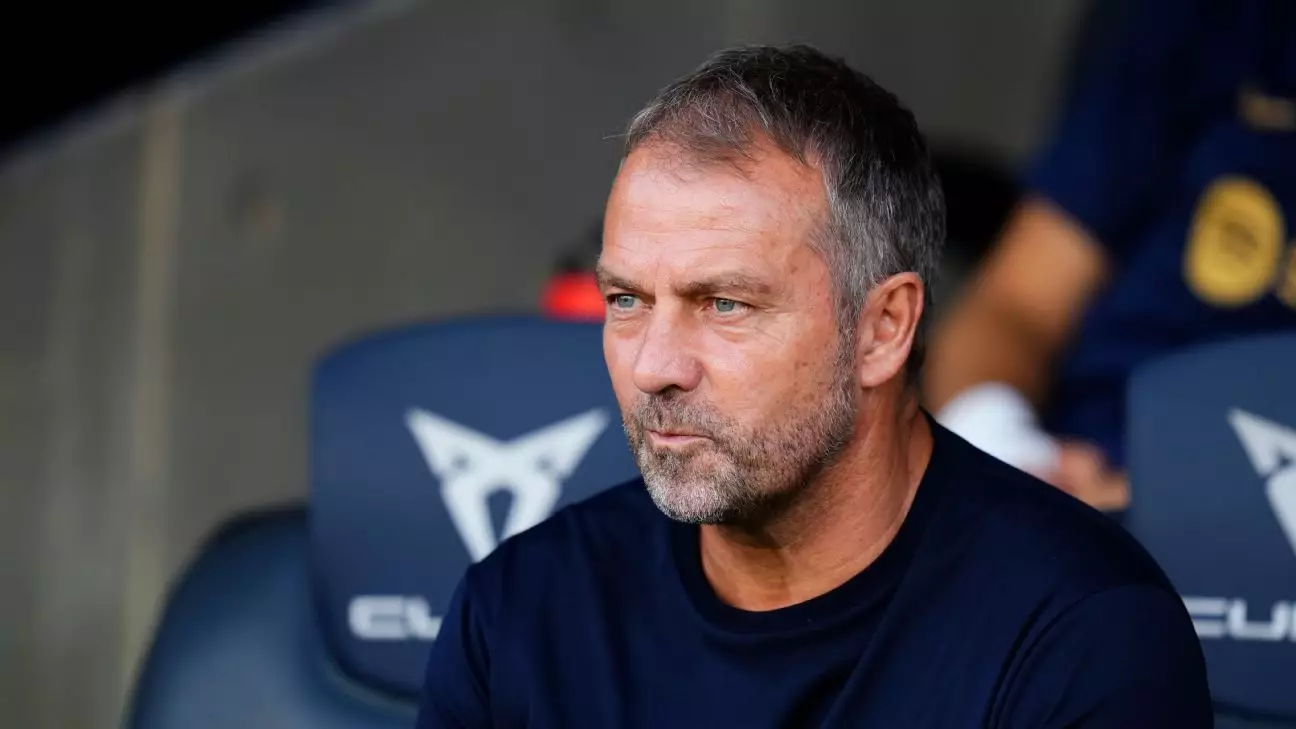The rollercoaster ride of FC Barcelona’s recent performances in LaLiga has left fans and analysts alike scratching their heads and questioning the team’s resilience. After an impressive start to the season, where they chalked up 11 victories in their first 12 matches, the current form has seen the team plunge into a winless streak of three games. Barcelona’s esteemed coach, Hansi Flick, has made it clear that a shift in mentality and discipline is imperative if the team is to regain its footing in the league and stave off the looming pressure that has begun to peer over their shoulders.
Barcelona once commanded a solid lead at the top of the LaLiga table, but following recent setbacks—including a stunning defeat to Real Sociedad, a disappointing draw against Celta Vigo, and a 2-1 loss to Las Palmas—the gap between them and rivals Real Madrid has dwindled to a solitary point. This rapid decline in form can understandably dishearten supporters and create an air of uncertainty around the team’s capabilities. Flick’s remarks underscore the necessity for a robust mental fortitude and unity, a call to action that resonates with both players and coaching staff alike.
Flick’s emphasis on teamwork speaks volumes about his understanding of modern football dynamics. He articulated the importance of fighting for each victory, suggesting that his young squad must acknowledge their role in the collective effort to turn the tide. With youth comes vitality, but it often necessitates learning how to channel that energy effectively within high-stakes situations.
A Young Team with Room for Growth
Barcelona prides itself on fostering young talent and setting the stage for the next generation of football stars. Flick noted that they are the youngest team in LaLiga, an observation that highlights both potential and vulnerability. Youthful exuberance, while beneficial, must be complemented by a sense of responsibility and cohesion on the pitch. Flick’s words illustrate a clear understanding that skill alone won’t secure victories; a fighting spirit is equally crucial.
Throughout his tenure, Flick has nurtured an environment conducive to learning and evolution, yet there remains a wide gulf between the team’s aspirations and their on-field execution. The recent performances indicate that areas of improvement persist, especially in the defensive unit. Flick’s assertion that the entire squad must defend as a unit provides a tactical blueprint for addressing the current inadequacies in defensive coordination.
Another critical component highlighted by Flick is the pressing need for clinical finishing opportunities. In competitive environments, the ability to convert chances can determine the outcome of matches. Barcelona is at a tipping point: while they may create opportunities, the failure to convert can hinder their ability to establish dominance, as evidenced in their fixtures against Las Palmas. Flick’s insistence on maintaining composure under pressure serves as a pivotal reminder that quality finishing can turn a tight game into a resounding victory.
In a league that thrives on the margins, the ability to assert control and deny opponents space is paramount. Flick’s conscious strategy of pressing and smothering the opposition could pave the way for transforming their recent misfortunes into a turnaround in fortunes—a challenge that beckons for immediate attention.
On a more optimistic note, Barcelona’s injury woes are gradually abating, with key players returning to the squad. The return of Lamine Yamal and Ferran Torres signals a strengthening of the squad’s depth—an invaluable asset considering the trio of challenging fixtures looming on the horizon. Furthermore, Dani Olmo’s availability brings additional creativity to the attack, while young midfielder Marc Casadó’s return post suspension is expected to fortify the side’s overall performance.
Flick’s comments regarding player performances amidst the backdrop of struggle reveal a layered understanding of football. While the team as a whole must improve, his recognition of individual contributions—specifically naming Pau Cubarsí, Iñigo Martínez, and Pedri—offers a nuanced perspective on the culture of resilience necessary for the good of the team.
As Barcelona embarks on what Flick describes as a significant week in their title pursuit, the importance of their upcoming fixtures cannot be overstated. A clash with Mallorca, followed by matches against Real Betis and Borussia Dortmund, will test the character and mettle of this young side. In the eyes of both supporters and critics, these games represent not just another opportunity for points but a true litmus test for Flick’s tactical ambitions and the team’s ability to respond to adversity.
FC Barcelona stands at a crossroads—armed with potential but challenged by recent performances. The journey ahead calls for unwavering commitment, tactical refinement, and collective resilience, propelling the team from their current slump back to prominence in LaLiga. The focus is clear: it’s time for Barcelona to showcase the tenacity that has long been synonymous with their club’s heritage.

